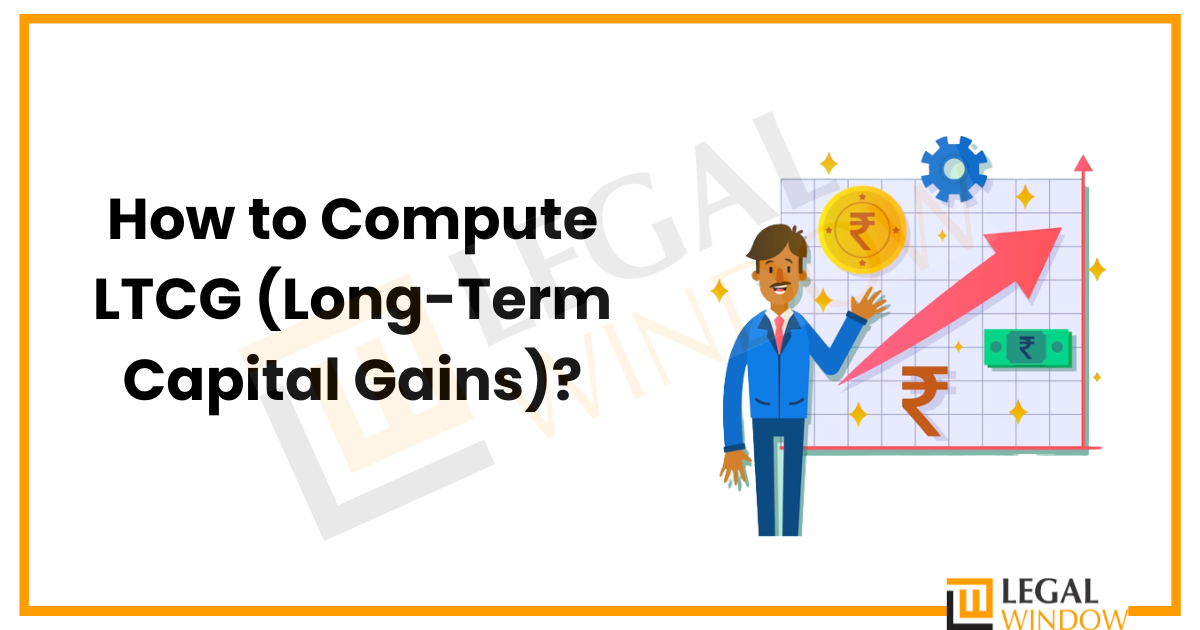
A successful alternative with the potential for expansion and wealth building is a stock investment. But, calculating long-term capital gains (LTCG) could take some time. This article gives a good knowledge and awareness on the computation of LTCG. Let’s look at long-term capital gains calculation methods!
| Contents: |
LTCG or Long-Term Capital Gains
Personal goods acquired in conjunction with a business or profession are referred to as capital assets. Bonds, mutual funds, jewelry, patents, and trademarks are typical capital assets. Personal use furniture, clothing, and rural agricultural property are not considered capital assets.
According to the Income Tax Act, 1961 profits from long-held assets like stocks, bonds, real estate, etc are subjected to the long-term capital gains tax, or LTCG tax, which has different short-term and long-term holding periods for each asset.
Categorization of Capital Assets
The following table accurately shows how long- and short-term capital gains are taxed when those considered as capital assets.
| Capital Asset | Holding period of the capital asset | |
|---|---|---|
| Short Term | Long Term | |
| Immovable property, such as real estate for a home | Less than two years | Two years or more |
| Movable or portable items like gold jewelry | Less than three years | Three years or more |
| Listed shares or securities | Less than one year | One year or more |
| Mutual funds which Equity-oriented | Less than one year | One year or more |
| Mutual funds which Debt-oriented | Less than three years | Three years or more |
LTCG Tax Calculator
A useful tool that displays your long-term capital gains and tax liability for equities-oriented mutual funds and listed equity shares is the long-term capital gains calculator or LTCG Calculator.
The holding period, purchase price, and sale price of the equity-oriented fund are entered in the formula box of the LTCG Calculator. The calculator will show the taxable long-term or short-term capital gain based on the holding period.
How to Operate LTCG Calculators?
With the help of this example, you may comprehend how an LTCG calculator functions. In May 2018, you paid Rs 1,000 for 200 shares of XYZ Company Ltd. In January 2020, you sold all 200 shares for Rs. 1,800 each.
You’ve owned the stock for longer than a year. LTCG is the Rs. 1,60,000 profit (200*1800 – 200*1000).
You must pay LTCG tax on gains exceeding Rs 1 lakh in a fiscal year. The LTCG tax is payable on Rs. 60,000. Using 10%, (Rs 1,60,000 – Rs 100,000). You have to pay Rs 6,000 in LTCG tax. (Rs 60,000@10%). In January 2019, when the share price was Rs 1,500, you sold 200 shares. Your 200 shares were purchased in May 2018 for Rs 2,000,000. Less than a year has passed since you acquired the shares. Short-term capital gains are the profit of Rs. 1,000,000 ($200*1500 – $200*1000).
The STCG (short-term capital gains) of Rs 1,000,000 * 15% = Rs 15,000 must be taxed at the 15% rate.
During the 2018 Union Budget, the long-term capital gains tax on equity-oriented securities and instruments was introduced. The new regulation was in effect for any transactions completed on or after April 1, 2018.
Winding Up Note
Investors need to understand the tax implications of their investments, one of which is the computation of LTCG, which is the profit earned from the selling of shares held for more than a year. Mastering the LTCG calculation can help investors maximize returns and reduce tax liabilities. It is thoroughly examined the procedure for calculating Long Term Capital Gains in this essay. With a little experience, investors may become experts in their own right and fully benefit from the tax advantages of long-term investments.
In case of any query regarding how long-term capital gain tax is calculated, feel free to connect with our legal experts at Legal Window at 72407-51000.
CA Pulkit Goyal, is a fellow member of the Institute of Chartered Accountants of India (ICAI) having 10 years of experience in the profession of Chartered Accountancy and thorough understanding of the corporate as well as non-corporate entities taxation system. His core area of practice is foreign company taxation which has given him an edge in analytical thinking & executing assignments with a unique perspective. He has worked as a consultant with professionally managed corporates. He has experience of writing in different areas and keep at pace with the latest changes and analyze the different implications of various provisions of the act.
Categories
- Agreement Drafting (23)
- Annual Compliance (11)
- Change in Business (36)
- Company Law (148)
- Compliance (90)
- Digital Banking (3)
- Drug License (3)
- FEMA (17)
- Finance Company (42)
- Foreign Taxation (6)
- FSSAI License/Registration (14)
- GST (118)
- Hallmark Registration (1)
- Income Tax (200)
- Latest News (34)
- Miscellaneous (164)
- NBFC Registration (8)
- NGO (14)
- SEBI Registration (6)
- Section 8 Company (7)
- Start and manage a business (21)
- Startup/ Registration (130)
- Trademark Registration/IPR (40)
Recent Posts
- NGO Darpan Registration in Jaipur May 2, 2024
- Registration of Charges with ROC May 1, 2024
- Post incorporation compliances for companies in India April 30, 2024
About us
LegalWindow.in is a professional technology driven platform of multidisciplined experts like CA/CS/Lawyers spanning with an aim to provide concrete solution to individuals, start-ups and other business organisation by maximising their growth at an affordable cost.









